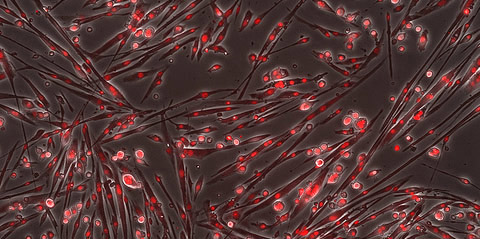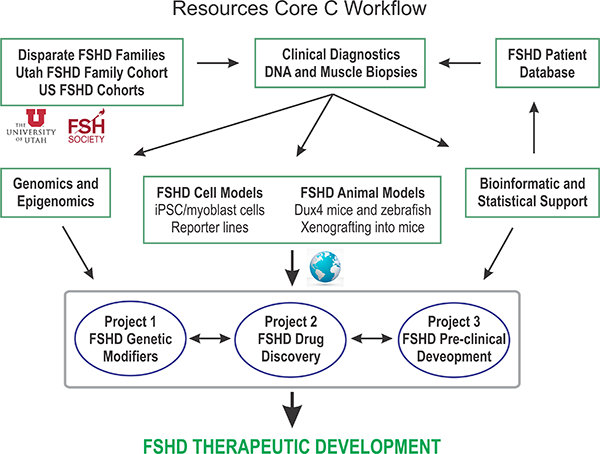Cores of Wellstone

Administrative Core A
The Administrative Core A provides financial management and facilitates communication and resources to support the research of our nationally dispersed investigators and trainees through web conferencing, a Center website, our annual retreat and other FSHD meetings, including sponsorship of the FSHD Patient-Researcher Networking meetings. Integral to our Administrative Core and the Center has been FSHD patient advocacy groups, particularly the FSHD Society, which has cost-shared the organization of meetings with our Center. The Administrative Core is located at the UMass Chan Medical School, which offers exceptional research and training facilities and administrative infrastructure to support the goals of the Center. The Center will continue to be supported and advised by our NIHCHD and Wellstone Program directors, and the active involvement of the Center Advisory Committee (CAC), which during the current cycle has included Drs. Bönnemann, Duan, McNally, Morris and Thornton. The CAC participates in annual retreats that have provided valuable feedback, advice, and mentoring to PIs and trainees on research progress and strategy. The Center administration is financially supported by UMass Chan, which provides a highly organized and effective administrative structure. The Center will continue to be provided with an experienced senior administrator, Michelle Landry, who oversees the financial management of the Center and grant renewal and an assistant, Debra Manseau, who works directly with the directors, Pis, and the trainees to organize Center activities and meetings and assist with billing and manuscript preparation. UMass Chan also provides significant cost sharing for the Education and Training Core B for traineeships and the Administrative Core A to support the cost of meetings and retreats.
Education and Training Core B
The Education and Training Core B has overseen the training of graduate students, postdoctoral fellows and clinical fellows, providing opportunities for trainees to gain skills in FSHD lab and clinical research and in scientific communication through monthly web conference meeting presentations, publications of research papers and reviews. Trainees also receive career mentoring from Wellstone PIs and CAC members and participate in patient education and bioethics training. Eleven fellows received competitive fellowships, inducing a development award from the Muscular Dystrophy Association, attesting to the quality of our Center trainees and the success of our program. Our future Center Education and Training program will continue to emphasize training of clinical fellows as well as graduate students and research fellows aided by cost sharing from UMass Chan.
Resources Core C
The Resources Core C, formerly the Cell Core, will have expanded functions to support Wellstone and greater FSHD community research. The Core will maintain and grow its unique repository of FSHD biomaterials that have enabled statistically powered studies of biomarkers and candidate drugs by our Center and industry and academic collaborators. Our repository includes blood, muscle, muscle cell lines derived from biopsies, and iPSC cells derived from fibroblasts and myogenic cells from FSHD patients and their first degree unaffected or non-manifesting relatives. Blood, muscle biopsies and derived early passage myogenic cells are banked from over 40 FSHD families, most including genetically unaffected control individuals, and with 19 families with first degree relatives with disparate/non-manifesting clinical disease. Myogenic cells from our Core C have increasingly been used as FSHD models for preclinical therapeutic studies with industry and academic partners. This has led to the establishment of an RNA-Seq database for accessing on- and off-target drug effects on the FSHD transcriptome. Biopsies also provide a unique resource to implement the Center’s xenograft models of FSHD, for testing disease therapeutics in mice harboring highly humanized FSHD muscle. Muscle cells derived from biopsies have been a significant resource for the field, with distributions to 33 FSHD research labs worldwide. The Resources Core C also will provide resources for maintaining our unique FSHD animal models to support the research of our projects and as new resources for FSHD researchers to move the field forward in therapeutic development. The Core will also continue to provide bioinformatics and statistical support for all projects and for analyzing and sharing data with the greater FSHD research community.
